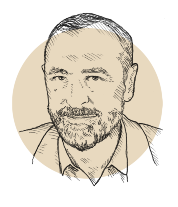He is familiar with New York, having taught at Columbia University for a year following his studies at the Ecole Normale Supérieure and the School of Advanced Studies in the Social Sciences (EHESS). After working as a writer for Jean-Yves Le Drian at the French Ministry of Defense in 2012, he went on to direct the Arc de Triomphe and the Pantheon. He then returned to work for Le Drian at the Ministry of Foreign Affairs as a counselor for culture and the Americas until this summer.
France-Amérique: How do you see your role as cultural counselor?
Gaëtan Bruel: Our work is founded on a mutual passion between France and the United States. It did not happen overnight, and it is not something we can take for granted. In each of our activities, we are lucky enough to have thousands of American Francophiles who are attached to our country. For decades, these people have watched movies, traveled to France, met people, and learned French. Our job today is to maintain and renew this connection for the future. We also want to show the American public our perspectives, whether French, European, or Francophone. Last but not least, we are here to guide the French cultural, educational, and academic landscape as it transforms, which also implies facing certain American realities.
We sometimes think Americans have a slightly dated vision of French culture. Do you think it needs modernizing?
There is perhaps a certain vision of France as a country whose cultural golden age is behind it. But I personally believe that Macron’s slogan “France is back” is also a cultural reality. Simply look at the diverse program in Paris this fall, the excellent figures from the FIAC (the International Contemporary Art Fair in Paris), the exceptional exhibitions on Leonardo da Vinci and Greco, and the incredible boom in cultural foundations. This all shows that our culture is far more than fine heritage! We have to promote both a vision of French culture as dreamed of by Americans and a culture they do not know; one which will surprise them. The U.S. public has expectations, and we have to meet them. But we also need to go beyond and show people our culture did not end with the Nouvelle Vague or French Theory!
How do you plan to promote this modernity?
Let us take the example of virtual reality (interactive 3D movies designed to be watched with special helmets, combining screens, earphones, and movement sensors). This field is emerging as a cultural practice, but its economic model is yet to be defined. The French model, which relies partly on public financing, is adapted to an emerging sector because it allows for risk-taking. This has enabled the early appearance of a virtual reality ecosystem with works receiving awards for years at festivals such as Sundance and Tribeca. This is a wonderful working project between our two countries. France is already recognized as a pool of talents in video games, design, and animation, and now virtual reality too. We have the chance to really promote these subjects.
What initiatives will you be launching in the coming months?
I am fortunate enough to have arrived in a fully-functioning operation, in which my main wish is to continue the work of my predecessor. But we are also in a partially new context, with a greater focus than ever on the renewal of target audiences and demographics. For example, how are we to contribute to the emergence of new generations of American Francophiles? This requires a clear knowledge of the people we are appealing to, including young people – without ageism – influential figures, the usual elites, but also other audiences, now more than ever, whose diversity is one of the true assets of this country. Certain initiatives in new fields will also be renewed, such as the La Nuit des Idées event in late January. We are also rethinking our system of cultural residences across the United States. We will be opening the Villa San Francisco in the spring – a nod to the Villa Medici in Rome and the Villa Kujoyama in Kyoto. Ours will be a multi-disciplinary residence on the top floor of the consulate. The first guest may even be a video game designer!
Interview published in the December 2019 of France-Amérique.












